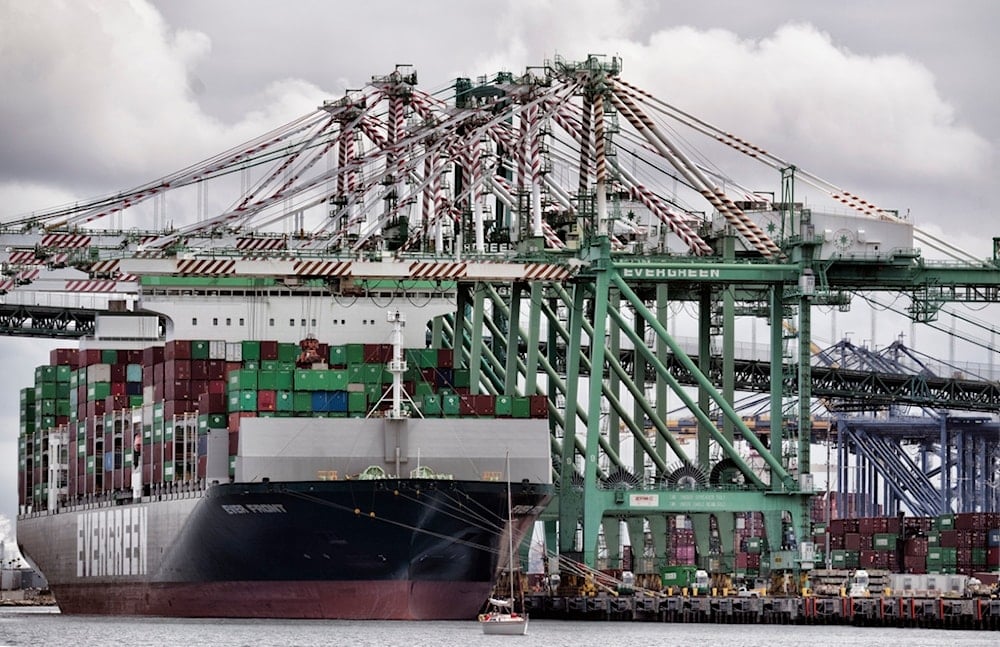US, China impose reciprocal port fees as trade tensions escalate
The United States and China have reignited trade tensions by imposing reciprocal port fees and new tariffs while tightening export controls.
-

A sailboat passes a cargo ship unloading containers at the port of Los Angeles in San Pedro on Thursday, June 15, 2023. (AP, File)
Trade tensions between Washington and Beijing have deepened as both nations introduce new port charges on each other's ships starting Tuesday, widening the scope of their economic confrontation beyond goods and into global maritime trade.
Beijing said its new fees are a countermeasure to US policies and will apply to vessels that are American-owned, operated, built, or registered, but not to those constructed in China. The move mirrors new US port charges that Washington argues are designed to bolster its domestic shipping industry, which has long struggled to compete with Asia's heavily subsidized shipyards.
Diplomacy under pressure
The announcement comes as China also tightens controls on rare earth exports, materials essential for electric vehicles, defense technologies, and consumer electronics, raising concerns over disruptions to critical global supply chains. The move prompted US President Donald Trump to threaten a further 100% tariff on Chinese imports if Beijing "continues weaponizing trade."
At the same time, new American duties have taken effect on timber, kitchen cabinetry, and upholstered furniture, sectors in which China is a dominant global supplier. Analysts say these measures, combined with rising freight and port costs, could push prices higher for US consumers and complicate efforts to tame inflation.
Despite the escalating measures, US Treasury Secretary Scott Bessent said on Monday that President Trump and Chinese President Xi Jinping are still expected to meet later this month in South Korea to discuss de-escalation efforts.
"The 100% tariff does not have to happen... The relationship, despite this announcement last week, is good. Lines of communication have reopened, so we'll see where it goes," said Bessent.
A spokesperson for China's commerce ministry echoed a readiness to talk but cautioned against US pressure tactics.
"China's position is consistent. If there's a fight, we'll fight to the end; if there's a talk, the door is open," they said. "The US cannot demand talks while simultaneously imposing new restrictive measures with threats and intimidation. This is not the right way to engage with China."
Port standoff
Chinese state media said the US fees violate a bilateral maritime transport agreement dating back more than two decades. In retaliation, Beijing will charge 400 yuan (£42; $56) per net tonne on ships linked to the United States, with the rate set to climb annually to 1,120 yuan per tonne by April 2028, according to state broadcaster CCTV.
Speaking to the BBC, freight analyst Claire Chong of Thurlestone Shipping estimated that bulk carriers hauling commodities, such as coal and iron ore, could face port fees of up to $3 million starting this week, potentially exceeding $10 million by 2028 for the largest vessels. She described the impact as "significant", noting that Chinese-built ships, which account for nearly half of the global dry bulk fleet, are exempt, a policy likely to give China's shipyards and shipping firms a competitive edge.
Beijing also added five US subsidiaries of South Korean shipbuilder Hanwha Ocean to its sanctions list, further straining relations with Washington. The sanctions restrict their operations in China and signal Beijing's willingness to expand the dispute to allied companies seen as aiding US policy goals.
Global reverberations
The shipping standoff adds to broader economic uncertainty just months after Washington and Beijing announced a temporary tariff truce in May. That agreement eased some triple-digit import duties that had threatened to freeze bilateral trade. Yet tensions never fully abated: US goods entering China still face a 10% levy, while Chinese exports to the US remain subject to tariffs about 30% higher than at the start of the year.
Economists warn that the new maritime levies could reverberate globally. Higher port fees may raise shipping costs worldwide, affecting commodity flows and consumer goods prices.
Bulk freight rates have already ticked upward, and analysts say rerouting vessels to avoid fees could lead to congestion in neutral ports in Southeast Asia and the Middle East.
Read more: Wall Street in trouble as Trump escalates tariff war with China

 4 Min Read
4 Min Read








